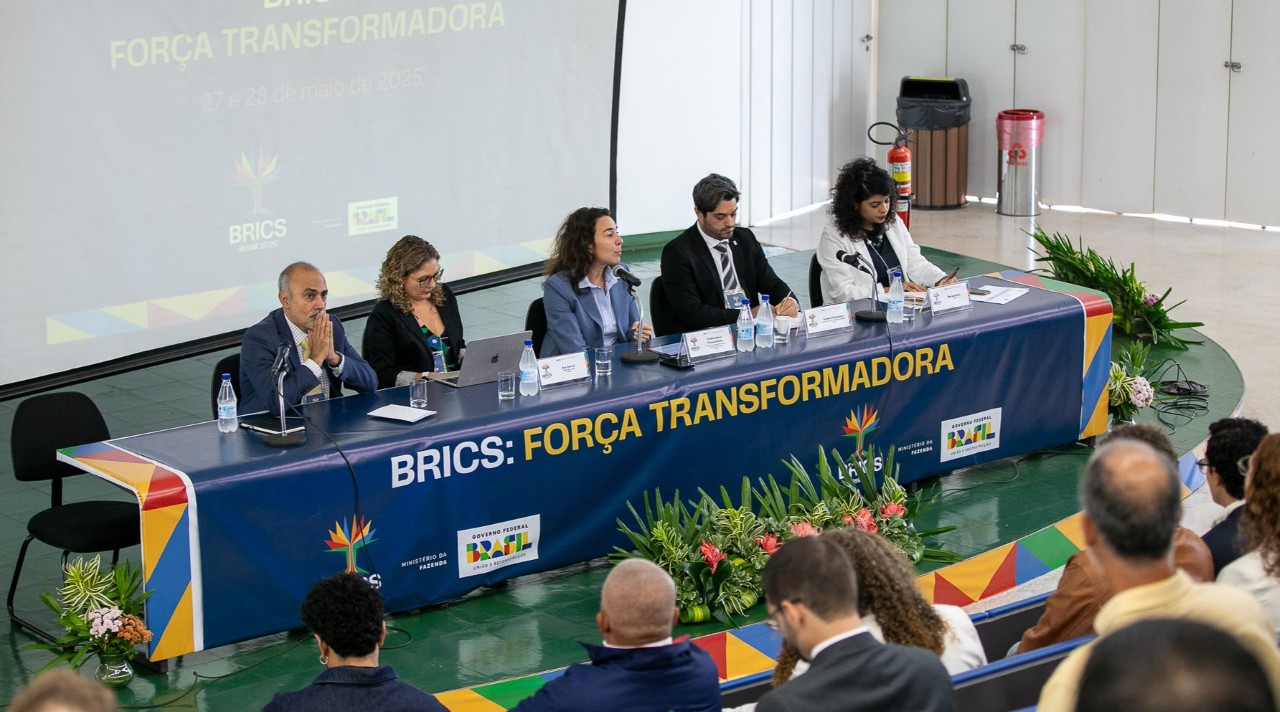Finance Ministry sees citizen engagement as “transformative force” in BRICS economic and financial discussions
The event “BRICS: Transformative Force,” held at the University of Brasilia, brought together civil society representatives, government officials, and national and international experts, reinforcing the importance of multilateralism and representation in global economic decision-making

By Franciéli Barcellos de Moraes | BRICS Brasil
In a year when Brasil holds the BRICS presidency, various national institutions have seized the opportunity to deepen discussions around the group, which brings together 20 nations from the Global South, including member states and partner countries. BRICS continues to strengthen its role as an emerging force in safeguarding multilateralism within the current geopolitical landscape. Among these institutions is the University of Brasília (UnB), located just minutes from the BRICS Brasil headquarters in the same city.
As part of "BRICS Week," organized by the capital's public university, the event "BRICS: Transformative Force" was held this Tuesday (27) and Wednesday (28), fostering exchanges among the academic community, federal government officials, national and international experts, and civil society representatives. Topics discussed over the two-day meeting included tax justice, reform of the international monetary and financial systems, and financing for equitable and sustainable social protection. The event was coordinated by the Ministry of Finance in collaboration with the University’s Institute of International Relations (Irel).
During the opening session, Ambassador Tatiana Rosito, Secretary for International Affairs at the Ministry, emphasized that the event builds on the successful experience of the previous year. Under Brasil’s G20 presidency, the Ministry strengthened citizen participation in shaping international priorities. "This continues the effort we made last year during the G20 presidency. We felt it was essential to carry that work over into BRICS,' she stated. In a 'world of challenges and transition," the ambassador underscored the dual role of BRICS coordination. "BRICS serves as both a force for transformation and stabilization—particularly in defending multilateralism while highlighting the asymmetry between developed and developing nations," she concluded.
"BRICS serves as both a force for transformation and stabilization—particularly in defending multilateralism while highlighting the asymmetry between developed and developing nations"
André Roncaglia, Brasil’s Executive Director at the International Monetary Fund (IMF), who participated in the closing session, pointed out that the global economy is undergoing a full restructuring — and in this context, BRICS has the potential to become more than just a forum for discussion. "BRICS plays a role within the IMF. Since Brasil holds the BRICS presidency this year, I’m chairing the BRICS directors at the Fund, and our goal is to address the IMF's limitations in responding to the most pressing needs of the Global South — countries in conflict, facing deep instability, or small island nations, for example," he explained, in reference to his work representing the Global South at the IMF.
The panel discussions held in the Darcy Ribeiro Auditorium featured participants such as Adrien Fabre (President of Global Redistribution Advocates), Leandro Ferreira (President of the Brazilian Basic Income Network – RBRB), Marco Fernandes (Landless Workers’ Movement – MST), Penélope Hawkins (United Nations Conference on Trade and Development – UNCTAD), Rozana Naves (Rector of the University of Brasilia), Luciana Servo (President of the Institute for Applied Economic Research – IPEA), and Vinicius Pinheiro (International Labour Organization – ILO).
Citizen participation
In line with the objective of Brazil’s BRICS presidency to promote more democratic and transparent global governance, the Ministry of Finance advances its broader effort to expand dialogue with civil society through this event. The initiative is based on the principle that public engagement is a fundamental pillar in shaping inclusive and representative public policies. In March, the Ministry had already convened two meetings — in Rio de Janeiro and São Paulo — to present the priorities of the BRICS economic and financial track.
These initiatives are expected to contribute to shaping the proposals to be discussed by BRICS Finance Ministers during their meeting on July 4 and 5, ahead of the Leaders' Summit scheduled for July 6 and 7.
English version by Judas Tadeu de A. Neto (UFC/POET)
Proofreading by Michel Emmanuel F. François (UFC/POET)